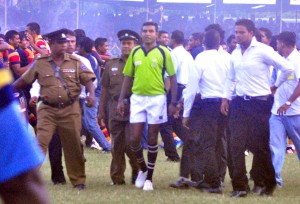Motivator-hygiene theory and refereeing
View(s):Rugby people moan and complain about referees and say that in the past they did not do it for money. They talk on the stature.  Pressed on they would say of former players who refereed and earned respect because of that. The game being faster and fitte referees are needed and universally the tendency is to have a different pathway for referees. It is accepted that fitness levels required for a top league referee can be achieved without difficulty by a person below 32 years of age. So they need to be caught as they leave school or give up the game in early club life.
Pressed on they would say of former players who refereed and earned respect because of that. The game being faster and fitte referees are needed and universally the tendency is to have a different pathway for referees. It is accepted that fitness levels required for a top league referee can be achieved without difficulty by a person below 32 years of age. So they need to be caught as they leave school or give up the game in early club life.
As less people are motivated to referee an analysis done by group of university students is worth talking about. They have used the theory of Herzberg, a behavioural scientist. He proposed a two-factor theory or the motivator-hygiene theory where some factors result in satisfaction while there are other job factors that prevent dissatisfaction.”
According to Herzberg, the hygiene factors cannot be regarded as motivators. Absence can lead to dissatisfaction. The motivational factors yield positive satisfaction. These factors are inherent to work. These factors that motivate the employees refer for a superior performance. These factors are called satisfiers. The motivators symbolized the psychological needs that were perceived as an additional benefit. Motivational factors include the following and each area has been applied to referees and the observations are given,
Recognition – The referees should be praised and recognized for their accomplishments by stakeholders. This was a key in the past that is talked fondly where as there is more criticism today.
Sense of achievement – They had and continue to have a sense of achievement which they continue to get same and is a reason to be on the field.
Growth and promotional opportunities – There growth and advancement opportunities are more now with a structure at home and Asia and more matches.
Responsibility – The referees as in the past take responsibility of the work and take ownership of the work. However the responsibility is being interfered in some quarters.
Meaningfulness of the work- The job of refereeing has been meaningful to those who do it and they continue to enjoy it. The way some want the referees to act is considered a threat.

Rugby refereeing is not an easy job at all
Despite a majority of motivators being present now and in the past there is a lack of people interested in refereeing. The issue is further analysed using Herzberg’s hygiene factors; seen from the point of why there is a reluctance to join the referee fraternity. The Hygiene factors – are essential for existence of motivation.
Pay – The pay or salary structure should be appropriate and reasonable. The pay was never a concern in the past and must not be pushed by money as some say. Similarly the coaches of the past did not take money. The field is no longer level with coaches even at junior level paid at least twice what a senior referee would get. The training needs of a referee are more and the needs to spend on nourishments as well as equipment.
Company and administrative policies – In this case it is rugby policies and its administration where there is a tendency to blame and criticize. Some think that even a full stop and a comma are used if there is nothing else. The policies should empathize from a referee perspective while being supportive and not critical.
Fringe benefits – The referee accepts some support as well as benefits that will support injury, training. Match watching etc.
Physical working conditions – The refereeing conditions are no longer safe while being subject to abuse. No or little action is taken when issues arise and are reported.
Status – The referee status is continuously reducing and ridiculed as compared to the past.
Interpersonal relations – The relationship within officials have deteriorated compared to the past. Suspect and more criticism is prevalent now.
Job Security – The referees need security and safety and feel that there is a huge vacuum which is covered by numbers of uniforms present but nothing solid as that happened as witnessed at Reid Avenue on two occasions.
The conclusion is that there is a greater degree of dissatisfaction arising from factors that cause dissatisfaction among current members as well as the bad publicity that affects those who may wish to join but prefer not to.
The criticism of referees is not new. Over the years it has come to a boil. When I spoke to S.W. Chang who had refereed at the highest level and was much respected, he laughed it off saying that the protest about referees has always been there and maybe it is as old as the game. Chang was the referee in two games that CH played and lost in the same year. There was a protest when he was appointed to the Knockout final and he opted out. CR beat CH with another referee by a score that was bigger than the aggregate of the first two matches. Who had the last laugh is a question? Another senior referee commented that two teams CR and CH which were complaining and not looking at improving players performance now lie at the bottom of the barrel.
Letters written by clubs and schools about referees date back five – ten years. The difference is, now they invade the field or the referee’s room.
The CR Rugby committee chairman wrote in 2007 about a referee and said “we reiterate that we have a legitimate grievance, and address through the proper channels without resorting to thuggery that has been seen recently.”
Next year schools will have at least four foreign coaches. The talk will be that we have spent so much but lost because of the referee. Last year we blamed the referees. One referee asked if “we are to be blamed and coaching is good then why are coaches being imported?”
Vimal Perera is a former Rugby Referee, coach and Accredited Referees Evaluator IRB
Follow @timesonlinelk
comments powered by Disqus


















